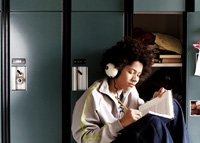Listening to Literature: Struggling Readers Respond to Recorded Books
Teachers find that audio books are sound reading tools.
Your content has been saved!
Go to My Saved Content.
Abbie Root, a fifth-grade teacher at Brookside Elementary School, in Grand Rapids, Michigan, started the year with only six of her twenty-seven students reading at grade level. She and itinerant reading specialist Janise Cole tried a new approach: Using recorded books from Pacific Learning's New Heights program, they asked children to listen to the text on tape while following along on paper, and repeat the exercise until they could read each story on their own. Between November and April, the number of grade-level readers in Root's class doubled, and, as she said then, "We still have six weeks of school left."
Root attributes much of the progress to the audio books and believes the tool would benefit her strong readers, too -- and teachers across the country are drawing the same conclusion. At J. T. Henley Middle School, in Albemarle County, Virginia, teacher Pat Harder (a member of The George Lucas Educational Foundation's National Advisory Board), uses audio books to expose students to text that's beyond their reading ability but that challenges their vocabulary and comprehension. That way, struggling readers aren't stuck with boring content, and they have the chance to learn to love literature.
Education professor Timothy Rasinski, of Kent State University, in Ohio, has also seen projects in which older students record audio books themselves for kids in the younger grades. "It definitely works," says Rasinski, who puts audio books in the same category as other forms of assisted reading. "There have been studies that looked at captioned television or just reading with a parent. Across the board, it seems to have wonderful potential for helping kids."
A perk of audio books is their accessibility -- an attribute that has everything to do with the Internet and its accompanying boom in audio technology. With a click, educators can download a book for multiple students to hear, either digitally or by burning the narrative onto a CD. For instance, Audible.com, a massive clearinghouse for digital audio, hosts an education section where visitors can download audible children's books, textbook supplements, newspaper articles, speeches, and SparkNotes, Barnes & Noble's online version of CliffsNotes.
Denise Johnson, assistant professor of reading education at the College of William and Mary, cautions in the Web-based journal Reading Online that audio books are not for every student. They're too fast or slow for some, and too cumbersome for those who prefer to read only on paper. She adds, though, that the technology can introduce children to new genres, cultivate critical listening, and highlight the humor in text, among other benefits. Johnson writes, "Understanding the message, thinking critically about the content, using imagination, and making connections are at the heart of what it means to be a reader and why kids learn to love books."
Additional Information
For digital audio books:
For CDs and cassettes:
For links to audio book reviews and resources:
To download an informational brochure for teachers and parents: